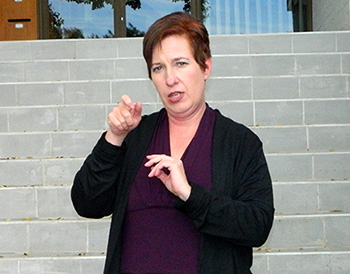Latest News Archive
Please select Category, Year, and then Month to display items
12 October 2020
|
Story Arina Engelbrecht
|
Photo Supplied
 Arina Engelbrecht from Organisational Development and Employee Well-being believes physical activity has a number of benefits for one’s health, including stress relief.
Arina Engelbrecht from Organisational Development and Employee Well-being believes physical activity has a number of benefits for one’s health, including stress relief.
Being physically active plays a big role in preventing the development of mental-health problems and in improving the quality of life of people experiencing mental-health problems.
Treatment for depression
Physical activity can be an alternative treatment for depression. It can be used as a stand-alone treatment or in combination with medication and/or psychological therapy. It promotes all kinds of changes in the brain, including neural growth, reduced inflammation, and new activity patterns are formed that promote feelings of calm and well-being. It releases endorphins – powerful chemicals in the brain that energise your spirit and make you feel good.
Physical activity can be very effective in relieving stress. Research in adults has found that physically active individuals tend to have lower stress levels compared to individuals who are less active. It also leads to improved sleep. When a person sleeps better and feels more rested, overall quality of life improves. They cope better with daily life stressors.
Reduce Alzheimer's risk
Regular physical activity can reduce your risk of developing Alzheimer's disease by up to 50%. It can also slow down further deterioration in those who have already started to develop cognitive problems. It stimulates the brain’s ability to maintain old connections as well as to make new ones.
A study asked people to rate their mood immediately after periods of physical activity (e.g. going for a walk/run, cycling, doing housework) and periods of inactivity (e.g. reading a book or watching television). Researchers found that participants felt more content, more awake, and calmer after being physically active compared to after periods of inactivity.
In conclusion, people who are physically active feel a sense of well-being, feel more energetic throughout the day, sleep better at night, have sharper memories, and feel more relaxed and positive about themselves and their lives.
“Being physically active not only changes your body, it changes your mind,
attitude, and your mood.” – Arina Engelbrecht
Martie Miranda one of only 10 SATI accredited sign language interpreters in South Africa
2015-04-23

Martie Miranda
Photo: Stefan Lotter |
The University of the Free State is privileged to have one of the top South African Sign Language (SASL) Interpreters as a staff member at the Unit for Students with Disabilities (USD).
Martie Miranda recently passed the accreditation exam of the South African Translators Institute (SATI), joining Dr Philemon Akach, previous HOD of the South African Sign Language Department of the UFS, in becoming one of only 10 SASL interpreters to be SATI accredited.
SATI is a professional association for language practice professionals in South Africa. Voluntary accreditation is offered at a professional level, ensuring a high standard of language practice. The system has become widely recognised, and is used as a recommendation or prerequisite for job applications by a number of institutions, including the South African government, particularly after the infamous ‘Jantjies incident’ with the funeral service of the late President Nelson Mandela.
Martie, a proud Child of Deaf Adults (CODA), has 18 years’ experience in SASL interpreting, lip speaking interpreting, and community interpreting as well as 15 years’ experience of conference and seminar interpreting. She boasts a Level 2 Advanced Interpreting qualification, and she has been mentoring Level 1 SASL interpreters for the past six years. Her extensive interpreting experience on a national and international level also includes Deafblind interpreting as well as Court and Legislature interpreting. She has interpreted three theatre productions, and has been coordinating the SASL services at the UFS since January 2009. She is responsible for the student management of all the hearing-impaired students at the USD.
Martie completed her BML degree (cum laude) at the UFS Business School in 2013, and received the award for top achiever in the programme during her final year. She will enrol for her MBA at the UFS Business School in July 2015.